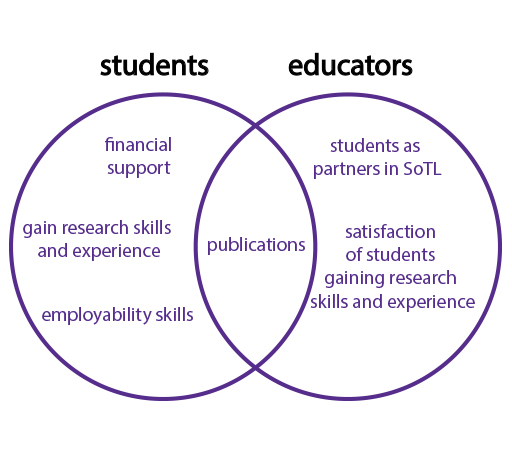1.2 Advantages of educator-student partnerships
Students bring experience and knowledge that only learners newer in the discipline than the educator can offer. Students involved in the SoTL research process promote a more balanced view of the power and authority embedded in educational interactions. Educators report that co-learning with students produced interdisciplinary sharing and a collaboration of insights, challenges and skilful ways to teach (Gayle, 2018).
Gaining an insider-knowledge of learning and teaching practices and institutional projects is of benefit to students, and can result in an increased sense of belonging and community (McConnell and Wisker, 2016). Students feel that they are making a difference for other students via engagement with SoTL.
Student researchers become more aware of their own process of learning and the circumstances under which they can best learn within a discipline (Cambridge, 1999).
Engaging with students as co-inquirers invites them to engage in the habits of critical reflection and collaboration that are necessary in their future careers (Plews and Amos, 2020). Students gain valuable skills of research, critical thinking, reflection, writing, speaking and listening, and they learn about the importance of data-driven analysis and evidence to effect change. Students gain confidence and leadership skills when they realise that their involvement in SoTL inquiries will improve the student experience of their peers and students who will come after them.
Mercer-Mapstone et al. (2017) describe that student-educator partnerships in SoTL inquiries lead to several positive outcomes: student engagement, increased motivation and ownership for learning, increased sense of confidence and self-awareness, and a sense of belonging to university, discipline and community.
For an educator, a partnership with students helps to bring multiple perspectives to bear on inquiry into teaching and learning practices. Collective challenging of assumptions and deeper questioning leads to new ways of thinking and understanding (Figure 2).
You will now consider a case study of a SoTL project in STEM that has involved students as partners.
Case study: How are students using extensions and what is the impact on success?
An example of co-inquiring in a current SoTL project in the Faculty of STEM at The Open University is of Cath Brown, a student, and Catherine Halliwell, an educator, collaboratively (and as co-investigators) investigating the impact of extensions to written assignments on student success at the OU on Level 2 Biology or Health Sciences modules.
This was a joint project from the outset, with the idea and proposal designed together by the student and educator, and all subsequent project decision-making likewise being joint. The project leaders used their understanding of their respective constituencies (Associate Lecturers or tutors and students) in various ways: informing the research questions; interrogation of the data; and being able to provide a uniquely non-judgemental environment when running focus groups for their respective peers.
The project also demonstrates an additional way in which ‘students as partners’ can be beneficial at the OU; OU students often bring a variety of skills and expertise from their prior experience and their employment. Here, this enabled the student to take the lead on the quantitative analysis in this project, while the educator led on interrogating the qualitative data. An additional student was also involved as a fellow focus group facilitator; this student was involved in discussions of how to run the groups and the topics to be covered.
Cath Brown, the student co-lead, relates her experiences:
‘One personal benefit is that as my background is hard-core STEM, the project has given me a useful insight into social science methods of research. I’ve also developed my skills in handling large data sets; whilst I’ve done quite a lot of working with data in my day job, it’s not been on this scale before.
I’ve enjoyed the opportunity to present our work internally and externally, and it has been great to see the interest we’ve had from our audiences. I’m looking forward to our being able to disseminate our final findings further, and to seeing their impact.
I think the best thing – apart from the project outcomes in themselves – is the fact this is a genuine partnership – we have worked together to make all the key decisions, and whilst obviously we have specific parts of the work we each do, we discuss them (even argue in a friendly way!), and we take a flexible approach and support each other.
I hope other students can get involved and have so fulfilling an experience.’
Catherine Halliwell, the educator co-lead, relates her experiences:
‘Working in partnership with a student investigator allows me to be much more adventurous in my research aims. We can ask questions that students might be reluctant to answer in front of academic staff, as we can use student facilitated focus groups to provide a safe and honest discussion space. Student investigators can help develop relevant questions in the context of their own learning experiences.’
If you are interested in knowing more about this project, see: How are students using extensions and what is the impact on success? [Tip: hold Ctrl and click a link to open it in a new tab. (Hide tip)]

